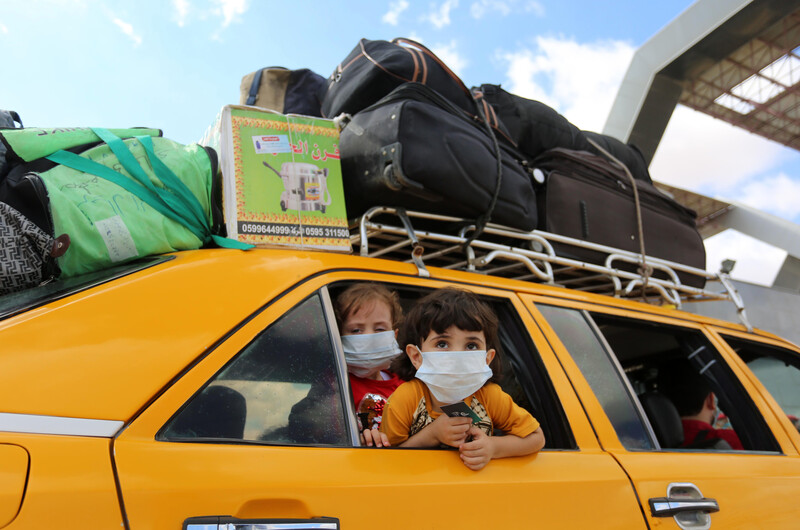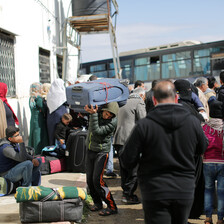The Electronic Intifada 27 August 2020

The border crossing between Gaza and Egypt reopened briefly this month after being closed since May.
APA imagesEarlier this year, I moved from Gaza to Cairo with the intention of working there.
I arrived in March. Little did I expect that the Egyptian authorities would introduce major restrictions on movement soon afterwards.
Life under confinement was harsh. I only went outside to buy groceries and for a little exercise.
During Ramadan, I was unable to visit a mosque.
I have been to Egypt many times over the past decade. My wife has been unwell and I have accompanied her on trips for treatment at a Cairo hospital.
This time I was on my own. I spoke constantly to my family in Gaza by mobile phone and over the internet.
Though technology ensured we could keep in touch, it did not compensate for their absence.
I missed them enormously and, though I was healthy, they were worried about me. They were hearing and reading news stories about how COVID-19 was spreading in Egypt.
Ordeal
Working as a freelance journalist during a partial lockdown was extremely difficult.
I pitched some articles to various media outlets but only had a few of them commissioned and published. I earned almost no money.
Still, I remained optimistic. It would only be a matter of time, I told myself, before the situation improved.
Traveling between Gaza and Egypt is an ordeal.
Rafah – Gaza’s southernmost city – and Cairo are only about 200 miles apart. Yet since Abdulfattah al-Sisi, then head of Egypt’s army, seized power in a 2013 coup, the trip between Rafah and Cairo has taken about 36 hours.
Before then, the journey took between five and seven hours, including a break for something to eat. Frequent checks by Egyptian troops in the Sinai now make the trip much longer.
In March, I shared a taxi from the Rafah crossing with five other people. Egyptian soldiers repeatedly stopped the car to search our luggage and examine our identity documents.
When we reached al-Firdan, a checkpoint used to inspect people traveling from Gaza, we were stopped for a full five hours.
When I finally made it to Cairo, I renewed my accreditation with the State Information Service. That enabled me to work as a journalist for three months.
To remain in Egypt after those three months, I needed a new residency permit.
The passports office – where I needed to apply for the permit – was closed because of the COVID-19 pandemic. It was June before I was able to visit it.
When I eventually made my application, a member of staff told me I should return to the passports office in a month’s time and check on my status. I returned as advised on 18 July and was told different things by two different bureaucrats.
The official with whom I had dealt in June assured me that I was indeed eligible for a residency permit. Another official, however, informed me that I could only stay until 25 July.
Going back to Gaza was not immediately possible, though, as the Rafah crossing was closed. The second official told me that provided I left Egypt when I could, I would not have to pay any fine for “overstaying” my permit.
Dark tunnel
On 11 August, I heard that the Rafah crossing was to be reopened for the first since May.
I immediately booked a taxi for the following day. Sadly, the driver of that taxi informed me a few hours later that he had been in a road accident and could not bring me.
So I called another taxi, which I was to share with a Spanish Palestinian friend.
The next day, we made our way through the Sinai. The trip seemed to last an eternity.
We had no overnight accommodation so we had to sleep by the side of the road near al-Firdan checkpoint.
As we finally neared Rafah, a few Egyptian soldiers directed the driver into a dark tunnel.
One of the soldiers spoke to me and my friend. Did we, the soldier wanted to know, have any cigarettes or tobacco for hookah pipes?
“Yes,” I replied.
The soldier ordered me to open my bag and he grabbed hold of a box containing seven packets of cigarettes. These packets could go no further, he told me.
I could either bring the tobacco or the cigarettes with me – not both.
An even greater surprise awaited me when I handed over my passport to a border officer for stamping.
The officer told me that I had overstayed my permitted time in Egypt. To enter Gaza, I must pay a penalty.
I became angry and shouted at the officer, arguing that I should not have to pay an “overstay” fine. But the officer would not relent.
I did not have enough cash with me for this fee and there was no ATM on the Egyptian side of the Rafah crossing.
Kindly, my traveling companion gave me some euros. I went to a cafe and exchanged them into Egyptian pounds.
When I returned to the officer, I handed him the equivalent of nearly $200.
It was the first time since 2017 that I was charged such a fee. The fee was completely unjust.
I had been unable to leave Egypt for Gaza as there was no way out.
I soon learned that I was not alone. Every Palestinian whose residency permit in Egypt had expired was being fined – despite how the Rafah crossing had been closed for the previous few months.
Why were we punished for something that was totally out of our control?
Rami Almeghari is a journalist and university lecturer based in the Gaza Strip.





